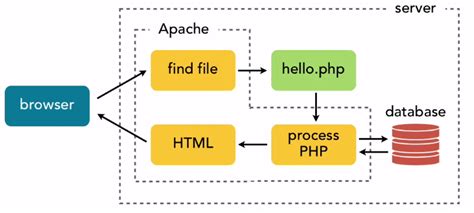The world of web development is complex and multifaceted, with numerous components working together to deliver the seamless online experiences we've grown accustomed to. Two crucial elements in this ecosystem are Apache and Nginx, two of the most popular web servers used in client-server applications. Understanding the importance of these web servers and how they operate can provide valuable insights into the mechanics of the web.
In the context of client-server architecture, web servers play a pivotal role. They are responsible for managing and serving web content, handling HTTP requests from clients (usually web browsers), and returning the requested resources. Apache and Nginx are two of the most widely used web servers, each with its own strengths and weaknesses.
Apache Web Server
Apache is one of the oldest and most widely used web servers, known for its flexibility, customizability, and broad range of features. Developed by the Apache Software Foundation, it was first released in 1995 and quickly gained popularity due to its open-source nature and ability to run on multiple platforms.
One of the key strengths of Apache is its modular design, which allows developers to easily add or remove features as needed. This is achieved through a vast array of modules, each designed to provide specific functionality, such as authentication, encryption, and compression. Apache's configuration files are also highly customizable, making it a favorite among developers who require fine-grained control over their web server.

Nginx Web Server
Nginx, pronounced "engine-x," is another highly popular web server that has gained significant traction in recent years. Developed by Igor Sysoev in 2002, Nginx was designed to address the limitations of traditional web servers, which were struggling to keep up with the increasing demand for high-performance web applications.
Nginx is known for its lightweight and high-performance architecture, which makes it particularly well-suited for serving static content, such as images, videos, and CSS files. Its event-driven, non-blocking I/O model allows it to handle a large number of concurrent connections with minimal overhead, making it an ideal choice for high-traffic websites.

Key Differences Between Apache and Nginx
While both Apache and Nginx are capable web servers, there are some key differences between them. Here are a few of the most notable:
- Performance: Nginx is generally considered to be faster and more lightweight than Apache, especially when serving static content.
- Scalability: Nginx is designed to handle a large number of concurrent connections, making it a better choice for high-traffic websites.
- Configuration: Apache's configuration files are highly customizable, but can be complex and overwhelming for beginners. Nginx's configuration files are generally more straightforward and easier to manage.
- Modules: Apache has a vast array of modules available, which can be both a blessing and a curse. Nginx also has a range of modules available, but they are not as extensive as Apache's.
Choosing Between Apache and Nginx
So, which web server is right for your client-server application? The answer ultimately depends on your specific needs and requirements. Here are a few scenarios to consider:
- High-traffic website: If you're building a high-traffic website with a large number of concurrent connections, Nginx may be the better choice due to its high-performance architecture.
- Complex configuration: If you require fine-grained control over your web server's configuration, Apache may be the better choice due to its highly customizable configuration files.
- Static content: If you're serving a large amount of static content, such as images, videos, and CSS files, Nginx may be the better choice due to its lightweight and high-performance architecture.

Conclusion
In conclusion, Apache and Nginx are both powerful web servers with their own strengths and weaknesses. Understanding the key differences between them can help you make an informed decision when choosing a web server for your client-server application. Whether you're building a high-traffic website or require fine-grained control over your web server's configuration, there's a web server out there that's right for you.
Gallery of Web Servers





FAQs
What is the main difference between Apache and Nginx?
+The main difference between Apache and Nginx is their architecture. Apache uses a process-based architecture, while Nginx uses an event-driven, non-blocking I/O model.
Which web server is more secure?
+Both Apache and Nginx are secure web servers, but Nginx is generally considered to be more secure due to its lightweight and high-performance architecture.
